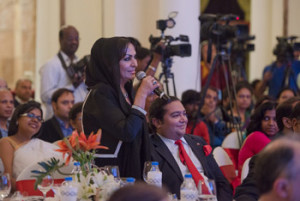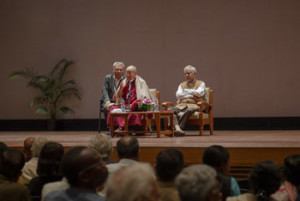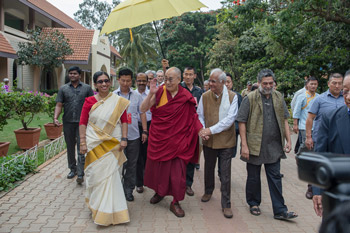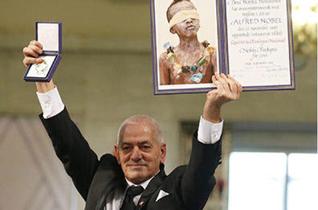Talks to Diplomatic Consular Corps of Karnataka and at National Institute of Advanced Studies
[dalailama.com] Bengaluru, Karnataka, India, 6 December 2015 – This morning in Bengaluru His Holiness the Dalai Lama was the guest of the Diplomatic Consular Corps of Karnataka. He was welcomed to the platform by Anatole Kuschpeta from France and invited to participate in lighting a lamp to inaugurate the occasion. HE Sabit Subasic, Ambassador of Bosnia & Herzegovina introduced His Holiness to the gathering, which included representatives from nearly twenty countries, referring to him as a symbol of hope, brightness, justice and humanity. Wishing him good health and a long life, he requested His Holiness to address them, which he did:
“Dear brothers and sisters whenever I meet people, I always consider them to brothers and sisters. In ancient times the idea of the oneness of humanity was something people might refer to in their religious prayers, but it didn’t have much relevance to their daily lives. Today, the oneness of humanity is a living reality. Conflict arises when we dwell too much on secondary differences between us: nationality, faith, whether we are rich or poor, educated or uneducated. Instead we should remember that we are all human beings. We were all born from a mother and nurtured by her milk. This is true even of troublemakers like Stalin and Hitler. All appreciate affection and are capable of showing affection to others.

Photo/Tenzin Choejor/OHHDL
“Scientists have conducted experiments on infants and established that they clearly respond favourably to images of others being helped and flinch from images of harm. Different experiments have shown that constant anger and fear disrupts our immune system. From these findings they conclude that basic human nature is positive and compassionate, which gives me hope.
“Many of the problems we face result from short-sighted and narrow-minded attitudes, from bias and prejudice. At a meeting in Argentina, biologist Humberto Maturana, mentor of my friend Francisco Varela, explained that although biology was his field of study, it was not proper that he should become attached to it. I reflected too that I am a Buddhist, but that I shouldn’t become attached to Buddhism, which would introduce a sense of bias. What is important today is that we consciously cultivate a sense of the oneness of humanity because we all depend on each other. This naturally gives rise to a sense of universal responsibility. In this context, given the current refugee problem in the world, to remain indifferent would be immoral.
“With regard to the word ‘peace’ in your theme ‘Peace for Economy’, I can talk about that, but as for ‘economy’, I don’t know. An example of the importance of recognising that we all belong to one human family, is that in discussions about what to do about climate change, we can no longer put national interests ahead of the global interest. We will only create a more peaceful and harmonious world if we adopt a peaceful approach by engaging in dialogue.”

Asked whether there is a solution to growing intolerance, His Holiness noted that India has for centuries been a multi-religious country. He remarked that in the West there are those who say the word secular reflects a disdain for religion, but here in India it represents respect for all religious traditions and even the views of those who have no faith.
Questioned about the meaning of the Buddha’s statement, ‘Be a light unto yourself’, His Holiness said we should remember that we have a right to enjoy peace and happiness and that the ultimate source of both is inner peace.
Ms Thoraya Al Awadhi introduced herself as being from Dubai in the UAE and asked for His Holiness’s support in improving the status of women. He told her that when he attended the first anniversary memorial service for the September 11th incident in Washington DC, he had defended Muslims and Islam. He had declared that it was quite wrong to generalize about an entire community on the basis of the mischief performed by a few with a Muslim background. He added that it was dangerous to view what was happening as a clash of civilizations. Concerning the refugee crisis in Europe, he repeated his view that there has to be greater effort towards restoring peace in the lands from which they have fled.
His Holiness explained how early human communities probably had no leaders, but when a need for them arose the criterion was physical strength which favoured males. Nowadays, education has made up for that difference. His Holiness then wondered if those attending the Paris climate change conference, who are currently about 90% male, were 50% women whether the world wouldn’t become a safer place much more quickly.

Elaborating further he suggested that while many people involved with the Paris climate change conference knew what had to be done, it would take significant political will to achieve it. He recommended keeping in mind that climate change is not only a global issue, but something that will affect future generations, the children and grandchildren of young people today.
To a suggestion that prayers offered to God above cause blessings to fall below, His Holiness remarked that prayer has a role in the cultivation of inner peace, but is ineffective when it comes to peace in the world. What was needed there was action. About nuclear weapons he said that a meeting of Nobel Peace Laureates in Rome last year heard a vivid report of the terrible destruction entailed in their actual use. The meeting resolved that a timetable must be set for the reduction and ultimate elimination of all nuclear weapons. He said that he had encouraged Japan, a staunch opponent of their use, to lead the campaign.
In the afternoon, His Holiness drove to the National Institute of Advanced Studies (NIAS), which is set on a campus richly forested with trees and bamboo. NIAS is a centre of higher learning engaged in interdisciplinary and multidisciplinary research in natural sciences, social sciences, arts and humanities and founded by JRD Tata. His Holiness was received and welcomed by the present NIAS director, Dr Baldev Raj a scientist and eminent educationist. His Holiness planted a sapling that will stand as a memorial to his visit.

In the NIAS hall Dr Baldev Raj introduced His Holiness to the audience and offered him a traditional shawl before requesting him to deliver the first NIAS Distinguished Fellow Lecture. He began by saying that it was a great honour to have been invited to speak.
“I often ask myself what is the purpose of our lives and conclude that life’s purpose is to be happy. We have no guarantee what will happen in the future, but we live in hope. That’s what keeps us going. Contrary to popular belief, the ultimate source of happiness is not a wealth of material goods but a mental feeling of joy. There is sometimes insufficient understanding of the difference between sensory consciousness and mental consciousness. Material things provide some satisfaction, but it is generally short-lived. Such satisfaction does little to allay anxiety and fear. On the other hand, mental joy sustains itself.”
His Holiness told the story of his meeting with a Catholic monk in Montserrat near Barcelona, Spain. The monk had spent five years meditating alone in the mountains living on little more than tea, bread and water. When asked about his practice, the monk replied that he meditated on love, and as he said this His Holiness noticed a sparkle in this eyes that betrayed his inner joy.
“What I conclude from this is that mental experience is far more effective than sensory experience. Therefore, to be happy we need inner strength and self-confidence. And it seems to me that warm-heartedness is the source of that inner strength.
“In this context, ancient Indian psychology was highly developed, much more so than modern psychology. Nevertheless, Indians today no longer pay much attention to this tradition, knowledge that we Tibetans have preserved and kept alive. I believe that it would be of great benefit if this science of mind were incorporated into modern education.”
Among questions from the floor, His Holiness was asked how to achieve the solitude necessary for meditation in a busy modern world. He replied that most people could find an hour or half an hour a day if they chose. He clarified that there are two major kinds of meditation. Shamatha or concentration requires a quiet place and a certain posture, but vipashyana or analytical meditation, thinking things through and analysing them, doesn’t demand such requirements.
Another person wanted to know why, if all religions convey a common positive message of compassion and forgiveness, so many bad things are done in the name of religion. His Holiness replied that it may seem like that when faith is mixed with attachment. When someone else suggested that practising compassion and forgiveness leaves you open to being taken advantage of, he said that in relation to forgiveness it’s important to distinguish the offending action from the agent who performs it. Tolerance and forgiveness don’t mean accepting the wrong that was done, but do involve showing compassion to the person who did it.
Finally, asked for a message for people in the modern world, His Holiness said that India has long upheld traditions of ahimsa, non-violence, and inter-religious harmony, and today what was important was to combine these traditions with modern technology to further positive development.
When it was brought to his attention that Mrs Raja Ramanna, widow of the great scientist, who was also the founder director of NIAS was in the audience, he told her:
“I really admired your husband. He once told me that although quantum physics represented a new body of knowledge, he had been pleased and surprised to find corresponding insights in the writings of Nagarjuna that preceded it by nearly two thousand years. He told me that, as an Indian, that made him very proud.”




